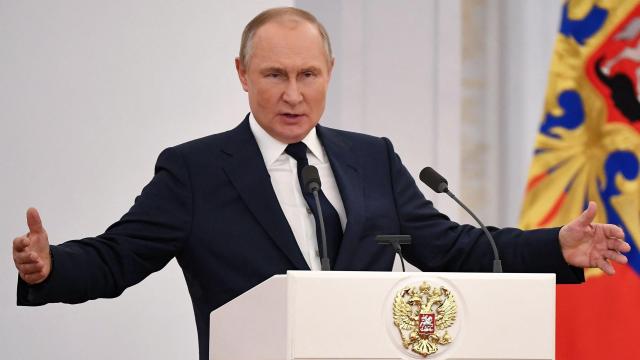The Russian government has added a new target to its geopolitical shit list: expat social media influencers.
As first reported by Bloomberg Monday, Russian-born social media influencers living outside the country are reportedly being targeted by government officials for discussing or posting about the Russian invasion of Ukraine, something the government insists isn’t actually really a war at all. The expats claim those officials are trying to censor their speech by threatening to prosecute them under a recently passed fake news law prohibiting criticism of Russia’s so-called “special military operation.” Violators of that law risk facing up to 15 years in prison.
Expats charged under the fake news decree vary in background, from journalists and political opposition figures to science fiction writers and lifestyle influencers. Izabella Evloeva, a Russian-born journalist living in Latvia, was reportedly sentenced to three years in prison for a Telegram post where she said the “Z” sign used by supporters of the war is a, “synonym for aggression, death, pain and shameless manipulation.” Alexei Navalny ally Violetta Grudina and journalist Alexander Nevzorov were both reportedly charged for spreading false information about the military on their socials.
A number of those influencers were also reportedly dubbed “foreign agents,” by Russian social media regulators. Under that designation, users are reportedly required to write a 24-word disclaimer accompanying each of their social media posts, a designation that risks scaring away potential advertisers. Failure to do so can reportedly result in criminal charges for those influencers if they return to Russia.
“The point is to destroy the audience’s trust as in the mass consciousness as the term ‘foreign agent’ is closely associated with Stalinist repressions, and to jeopardize their advertising revenue as advertisers contact them less,” Maria Kuznetsova, a spokesperson for rights group OVD-Info said in an interview with Bloomberg.
Some of the expats recalled receiving strange text messages from their banks that resembled phishing schemes. In other cases, Bloomberg claims YouTube reportedly advised expats to remove videos critical of the war following pressure from Russian government officials. Russia’s top internet censors lashed out at YouTube back in March for allegedly facilitating “information attacks” on its platform.
YouTube told Bloomberg it removes content that violates Russian laws after a valid legal request is made. Refusing to do some comes with consequences. The company claims it was previously fined the equivalent of $US255,000 ($353,991) for failing to comply with Russia’s censorship laws in April. That’s a paltry sum for a company with revenues as gargantuan as YouTube’s, but the number can add up if the fines escalate.
“There’s a normal psychological reaction to try and find this funny, but it is not,” journalist Andrei Soldatov told Bloomberg. “My family is still in Moscow, and my 70-year-old father is under investigation. They’ve stolen my money, and I have to be careful where I travel.”
Russia’s prolonged social media crackdown
Russia’s targeting of expats comes simultaneously amid a wider crackdown on social media and traditional media services throughout the country. Though suppression of political opposition language in Russia isn’t necessarily new the sheer volume of arrests has skyrocketed since the February invasion. Domestically, OVD-Info estimates around 16,300 people have been detained for breaking the shambolic fake news law.
Foreign internet companies operating in Russia, which have endured growing government resistance for years, have also faced drastically new levels of scrutiny. In the most extreme example, Facebook owner Meta was ordered to cease operation in the country and labelled an “extremist organisation,” after it supposedly “censored” Russian state media on its platforms. That extremist designation puts the company on the list that includes the Taliban and the Islamic State. Russia also invoked similar bans on Instagram specifically, ceding ground for a new category of half-backed homemade IG clones.
